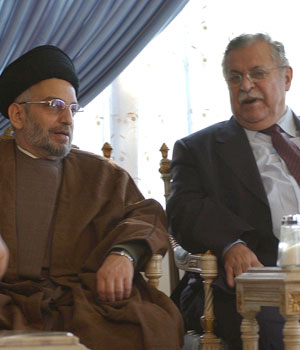
Abdel Aziz Hakim, leader of a formerly Iran-based religious party that is one of the main planks of the Shiite United Iraqi Alliance, sits with Iraqi President Jalal Talabani, 29 December 2005, in the northern Kurdish town of Dukan (AFP)
BAGHDAD, (Reuters) – The arrival of foreign experts should defuse a crisis over the results of this month’s Iraqi election by letting disappointed Sunni Arab leaders drop demands for a rerun while saving face, officials said on Friday.
Sunni and secular political leaders, who have organised demonstrations denouncing as fraud a result that maintained the dominance of Shi’ite Islamists, gave Thursday’s announcement of the mission a cautious welcome.
They concede, privately at least, that there will be no rerun and are negotiating with the Shi’ites and their Kurdish government allies for places in a new, grand coalition.
Acknowledging that there was little the handful of observers was likely to do at this stage in the process that could change dramatically the outcome of the vote, Electoral Commission chief Hussein Hindawi told Reuters: “It’s just an assessment.”
“This is intended to please some political factions who have asked for this,” he said. The team from the International Mission for Iraqi Elections (IMIE) comprises two Arab League representatives, a Canadian politician and European academic.
“Their evaluation will probably solve this political crisis,” Hindawi said.
Other electoral officials in Baghdad said the mission, hailed by the U.S. ambassador, was a face-saving exercise that would allow the losers to climb down from their demands without alienating supporters. U.S. officials have been working behind the scenes to defuse tensions and promote consensus.
The observers will augment an existing mission of a similar size from the same organisation and will largely be restricted to reviewing the process by which the results were arrived at.
RESULTS CLOSE
“The outcome of the election is already clear,” one election official said, noting that United Nations officials in Baghdad, as well as the White House, have declared the Dec. 15 fair.
Immediately after the vote, the IMIE said: “While there is some concern over technical and procedural issues … the election in Iraq has generally met international standards.”
Among more than 1,000 complaints to the Electoral Commission, officials say only three dozen were considered serious enough to require the possible invalidation of a ballot box — of which there were more than 30,000.
The Commission hopes to have resolved these and be in a position to announce a final result next week, one official said, adding it was not clear whether the international mission would cause that to be delayed — a postponement that could hold up parliament’s first sitting and the formation of a government.
Former Prime Minister Iyad Allawi, who heads a broad secular coalition, welcomed the imminent arrival of the observers. “We appeal to all parties to deal fully and with transparency with (them),” he said in a statement distributed by the U.S. embassy.
The U.S. ambassador, Zalmay Khalilzad, said: “These experts will arrive immediately and we are ready to assist them, if needed.” He urged all Iraqi leaders to unite to “serve all the people of Iraq, regardless of sect, ethnicity or gender”.
Iyad al-Samarraie of the Iraqi Islamic Party, part of the main Sunni bloc, was cautious.
“The arrival of this committee shows the international community has responded to our demands,” he said, adding: “If we see it is willing only to check technical irregularities, we’ll have to think about what to do.”
Another Sunni leader, Saleh al-Mutlak, said: “It’s a pity this visit comes after the U.N. envoy … called the election successful … In any case, we intend to cooperate with the team and provide conclusive proof the election was rigged.”

An Iraqi woman and children sit outside outside their house as they enjoy the sunshine in Baghdad December 29, 2005 (REUTERS)

An Iraqi man is seen through a damaged police car window at Al-Tahriyat square in Baghdad, 30 December 2005, after a road side bomb targeted a police convoy (EPA)
